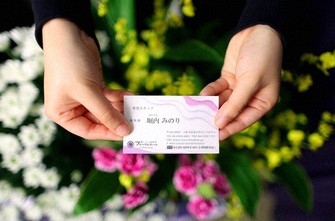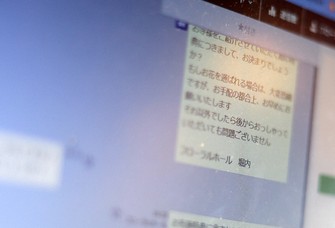
A woman working under the business name Minori Horiuchi presents a business card in Osaka’s Joto Ward on July 25, 2025, in this partially modified image. (Mainichi/Yuichi Nakagawa)
OSAKA — In June, a 28-year-old woman working at the Osaka-based funeral company “Kazoku-so no Floral Hall” began going by the name “Minori Horiuchi.” This is her “business name.” Moves to introduce such pseudonyms are increasing across industries in Japan from the perspective of protecting workers’ privacy and countering harassment from customers.
The woman’s real surname is rare, and there are said to be only around 10 people in Japan with the same name. One of her family members is a scholar, and she heard that this person had been harassed by someone with opposing views. She feared that revealing her real name to an unspecified large number of people could lead to her identity being exposed, so she changed her business surname to “Horiuchi,” which was used by a relative. Her real name, she said, “is a very unusual surname, so people would immediately connect it to me. It’s not that something happened in the past, but I’m using this (business name) to prevent any issue in the future.”
While attending to customers at work, the woman wears a name tag, and when handling online consultations, staff must provide a name to reassure clients. She has seen online reviews mentioning colleagues by name.
“I think elderly customers write reviews to express their gratitude, but I worry that, without ill intent, many customers in this industry end up posting real names online,” she divulged.
This year, the company started receiving phone calls bordering on sexual harassment of the female staff, which it says accelerated the adoption of business names. The company had been considering such a system to protect employees, and the business name system materialized following a request from Horiuchi. Now, her business cards, name tags, email address and even invoice signatures all use “Minori Horiuchi.”
“Before, I sometimes gave my name to customers and sometimes didn’t, but now I can introduce myself with confidence,” she says. Besides cases like hers, employees can also change their names if they don’t want former spouses or others to know their workplace.
A company representative said, “We sometimes serve clients whose feelings are delicate after losing a loved one or who are in a high state of emotion, so harassment by customers can easily occur at funerals. We introduced business names to protect employees from a particular kind of customer.” On the other hand, the company acknowledges the risk that customers may see business names as false names and point out a lack of sincerity, but the representative added, “It doesn’t affect the quality of service, so the challenge is how to help customers understand this.”

When responding to online inquiries, as seen in this image taken in Osaka’s Joto Ward on July 25, 2025, staff at the woman’s company are required to display a name. (Mainichi/Yuichi Nakagawa)
At the Neyagawa Municipal Government in Osaka Prefecture, business names were similarly introduced in April. A representative of the city’s personnel affairs office explained, “People’s social media accounts can be identified from their real names, and sometimes staff get told, ‘I’ve got your name now.’ With customer harassment becoming a social issue, we introduced business names to create a safer work environment.”
Because of the nature of government work, many tasks still require real names, so the only things staff can change are name tags with the surnames written with hiragana characters, as opposed to kanji. Staff usually use their real name tags, but switch to business name tags when serving citizens at the counter, among other occasions.
In 2023, the Ministry of Land, Infrastructure, Transport and Tourism abolished the requirement for bus and taxi drivers to display their real names. Following this, the Keio Dentetsu Bus Co. group based in the suburban Tokyo city of Fuchu allowed employees to choose business names. Major convenience stores and cafes are also taking measures, such as having staff use only alphabet letters or job titles on their name tags without displaying their real names in Japanese.
Kenji Tsukagoshi, a part-time lecturer in information sociology at Gakushuin University, commented, “Names themselves have become a risk, as people can write unverified things about you on social media, so there is merit in being able to prevent damage in advance. A name is the ultimate form of identity, and using a business name allows people to separate work from private life. Just as entertainers use stage names, it is thought such needs are growing among ordinary workers as well.”
(Japanese original by Yuichi Nakagawa, Osaka Photo and Video Department)


AloJapan.com